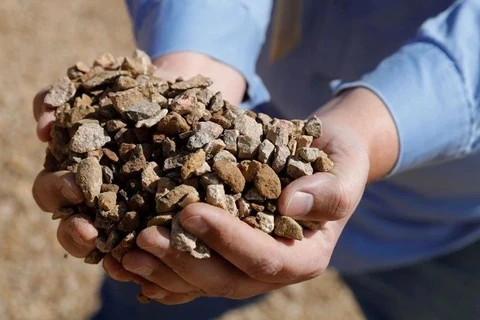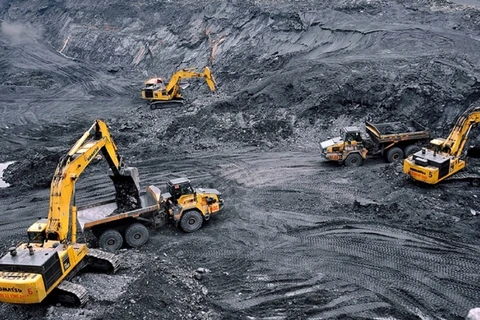Hanoi (VNS/VNA) – Vietnam’s rare earth mining industry will likely experience rapid growth in the near future, according to industry experts, as demand has been on the rise steadily in the last few decades.
According to Asia Briefing, a consultant service for investors in Asia, rare earths are essential elements for the production of various products, including cancer drugs, smartphones, and renewable energy technologies, most notably EV batteries.
As the global economy makes a shift to greener and more environmentally friendly energy, rare earth has become a much sought-after commodity on the international market.
According to several studies, China could possess up to 90% of the entire world's reserve of rare earth. As trade tension has been on the rise between China and the US, more companies have been looking for an alternative for Chinese rare earth in a hedging attempt.
According to Reuters, magnet firms from the Republic of Korea (RoK) and China, including an Apple supplier, are set to open factories in the Southeast Asian country.
"The RoK’s Star Group Industrial (SGI) and China's Baotou INST Magnetic would join companies in sectors as varied as electronics and automobiles in shifting assembly lines against a backdrop of increasing trade restrictions, with clients even requesting the move," the newswire service reported.
Vietnam’s rare earth reserves, which are second only to that of China and estimated at 20 million tonnes, remained largely untapped. The country's reserves are mainly distributed in the Northwest region of the country while rare earth mining is mainly concentrated in the Northwest and Central Highlands.
According to Asia Briefing, Vietnam and Japan have forged a close collaborative link in discovering and extracting rare earth. The rare commodity was reportedly found in a number of provinces across the country including Lao Cai, Yen Bai, Ha Giang, Cao Bang, Lang Son, Nghe An, Kon Tum and Lam Dong with the highest known volume in northern Lai Chau province.
In December 2014, a licence was granted to the Lai Chau Rare Earth Joint Stock Company and their Japanese partner to start the extraction of rare earth ores from a site in the province, which was said to be capable of large-scale industrial operation.
Last September, the province hosted a delegation of RoK experts on rare earth mining to discuss the potential of investment.
The Southeast Asian country has still a long way to catch up with its northern neighbour, said industry experts.
According to Reuters, SGI's Vietnam project, for instance, targets 2025 output of 5,000 tonnes of high-end neodymium (NdFeB) magnets per year, enough for 2 million electric vehicles (EVs). However, the country produces just 1% of the world's magnets, showed Adamas Intelligence data cited in a US Department of Energy report, compared with China's 92%.
The country also faces daunting challenges in accessing advanced processing technologies and investment capital.
Interest, however, has been growing as countries scramble to secure supply of the critical minerals. Vietnam also enjoyed other advantages such as low labour costs and market access afforded by multiple major trade deals including the Comprehensive and Progressive Agreement for Trans-Pacific Partnership (CPTPP), the EU-Vietnam Free Trade Agreement (EVFTA) and the Regional Comprehensive Economic Partnership (RCEP)./.
According to Asia Briefing, a consultant service for investors in Asia, rare earths are essential elements for the production of various products, including cancer drugs, smartphones, and renewable energy technologies, most notably EV batteries.
As the global economy makes a shift to greener and more environmentally friendly energy, rare earth has become a much sought-after commodity on the international market.
According to several studies, China could possess up to 90% of the entire world's reserve of rare earth. As trade tension has been on the rise between China and the US, more companies have been looking for an alternative for Chinese rare earth in a hedging attempt.
According to Reuters, magnet firms from the Republic of Korea (RoK) and China, including an Apple supplier, are set to open factories in the Southeast Asian country.
"The RoK’s Star Group Industrial (SGI) and China's Baotou INST Magnetic would join companies in sectors as varied as electronics and automobiles in shifting assembly lines against a backdrop of increasing trade restrictions, with clients even requesting the move," the newswire service reported.
Vietnam’s rare earth reserves, which are second only to that of China and estimated at 20 million tonnes, remained largely untapped. The country's reserves are mainly distributed in the Northwest region of the country while rare earth mining is mainly concentrated in the Northwest and Central Highlands.
According to Asia Briefing, Vietnam and Japan have forged a close collaborative link in discovering and extracting rare earth. The rare commodity was reportedly found in a number of provinces across the country including Lao Cai, Yen Bai, Ha Giang, Cao Bang, Lang Son, Nghe An, Kon Tum and Lam Dong with the highest known volume in northern Lai Chau province.
In December 2014, a licence was granted to the Lai Chau Rare Earth Joint Stock Company and their Japanese partner to start the extraction of rare earth ores from a site in the province, which was said to be capable of large-scale industrial operation.
Last September, the province hosted a delegation of RoK experts on rare earth mining to discuss the potential of investment.
The Southeast Asian country has still a long way to catch up with its northern neighbour, said industry experts.
According to Reuters, SGI's Vietnam project, for instance, targets 2025 output of 5,000 tonnes of high-end neodymium (NdFeB) magnets per year, enough for 2 million electric vehicles (EVs). However, the country produces just 1% of the world's magnets, showed Adamas Intelligence data cited in a US Department of Energy report, compared with China's 92%.
The country also faces daunting challenges in accessing advanced processing technologies and investment capital.
Interest, however, has been growing as countries scramble to secure supply of the critical minerals. Vietnam also enjoyed other advantages such as low labour costs and market access afforded by multiple major trade deals including the Comprehensive and Progressive Agreement for Trans-Pacific Partnership (CPTPP), the EU-Vietnam Free Trade Agreement (EVFTA) and the Regional Comprehensive Economic Partnership (RCEP)./.
VNA






















